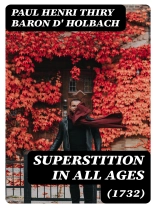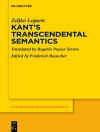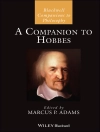In ‘Superstition in All Ages, ‘ Paul Henri Thiry baron d’Holbach presents a rigorous examination of the role of superstition throughout human history, articulating how it has shaped societies and influenced individual behavior. Written in a clear yet incisive literary style indicative of the Enlightenment, d’Holbach critiques religious and superstitious beliefs that have pervaded cultures from ancient times to his own, emphasizing a rationalist perspective that champions reason over faith. The text is rich with historical anecdotes, philosophical arguments, and a systematic deconstruction of superstitions, making it a seminal work in the inventory of Enlightenment thought that interrogates the lingering shadow of ignorance amidst the advancement of science and reason. Baron d’Holbach, a prominent figure in the French Enlightenment, was deeply influenced by the rise of rationalist thinking and the scientific revolution that characterized his era. As an outspoken advocate for atheism and materialism, d’Holbach’s philosophical upbringing provided him with the tools to critique dogmatic systems of belief, positioning him as a key intellectual in the push toward secular humanism. His vibrant social network, which included luminaries such as Voltaire and Rousseau, likely encouraged his pursuit of such a profound subject. This book is recommended for readers interested in Enlightenment philosophies, religious studies, and the historical interplay between superstition and reason. D’Holbach’s arguments challenge readers to reflect critically on their own beliefs, making it a timeless piece that invites dialogue on faith, reason, and the evolution of human thought.
Circa l’autore
Paul Henri Thiry, Baron d’Holbach (1723-1789), was a Franco-German philosopher and an eminent figure of the French Enlightenment who wrote under the pseudonym Jean Meslier. D’Holbach is often remembered for his outspoken atheism and for his works that critiqued religion and advocated for a materialistic view of the universe. Born in Heidelberg, Palatinate on December 8, 1723, d’Holbach later moved to Paris, where he became an integral member of the intellectual salons that were at the heart of Enlightenment thought. He was an encyclopedist and a generous patron to many other Enlightenment figures such as Denis Diderot. D’Holbach’s ‘Superstition In All Ages’ (1732) is one of his most notable works. Often published under the pseudonym Jean Meslier, this book articulates a critical examination of religion and its impact on society, contending that superstition is an impediment to human progress. D’Holbach’s literary style is characterized by a clear, rigorous exposition of his philosophical ideas, which was instrumental in spreading radical materialist and atheist thought in the 18th century. Alongside ‘Superstition In All Ages’, d’Holbach wrote several other works, including ‘System of Nature’ (1770) and ‘The Social System’ (1773), which further develop his philosophical and moral ideas. These works cemented his reputation as one of the boldest thinkers of his time, challenging established religious and moral norms. D’Holbach’s contributions to literature and philosophy sparked debate during his lifetime and influenced future thinkers and critics of religion.












